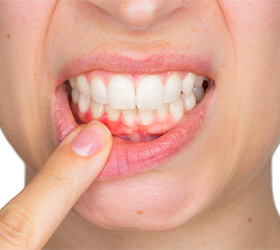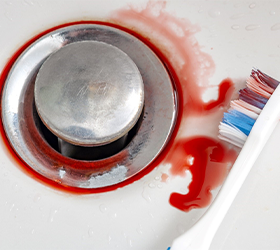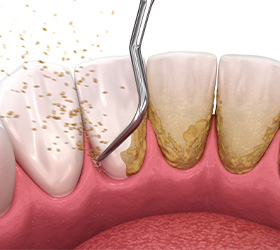Gum Disease Treatment – Bloomfield Hills
Fight Gum Disease to Keep Your Smile Healthy!

Did you know that an estimated 80 percent of adults live with some level of gum disease, and many don’t even realize it? Research has also linked gum disease with serious health problems, like heart disease, osteoporosis, low birth weight, and diabetes complications. Because the early signs are often mild, many people don’t seek treatment right away. Regular checkups allow us to monitor your dental health and spot problems early. Safeguard your oral health. To make an appointment, call our Bloomfield Hills dental office today.
Why Choose Cranbrook Dental Care for Gum Disease Treatment?
- Multiple Treatment Options
- In-Office Affordable Dental Assistance Plan
- Financing Options Available
What Is Gum Disease?

Gum disease is an infection of the gums and supportive tissues. In the majority of cases, it is caused by plaque and tartar buildup due to poor oral hygiene. This infection can result in permanent gum damage, tooth loss, and other serious health risks if it isn’t addressed. Here are the two different stages of gum disease:
- Gingivitis: This is the earliest stage of gum disease, it can generally be reversed by improving your at-home dental hygiene routine and seeing your dentist for routine cleanings and checkups.
- Periodontitis: This is a more advanced stage of gum disease. At this point, it can only be managed, not reversed. However, management is necessary to prevent further infection and serious complications, including tooth loss.
There are a few factors that can increase your risk of gum disease. The more prevalent ones include smoking, chewing tobacco, poor oral hygiene, genetic factors, immune-compromising conditions, medications, and hormonal changes caused by pregnancy.
Symptoms of Gum Disease

You should always be on the lookout for signs of gum disease so that you know when changes need to be made. If you notice any of the symptoms listed below, you should schedule a visit with us. This way, we can take a look at your smile and put together a treatment plan that is right for you.
Gingivitis Symptoms:
- Halitosis (bad breath)
- Bleeding when brushing/flossing
- Red/inflamed gum tissue
- Gum tenderness
- Gum recession
Periodontitis Symptoms:
- Pain when chewing
- Loose teeth
- Sensitive teeth
- Bite changes
- Tooth loss
How Do We Treat Gum Disease?

Before we are able to treat your gums, we need to thoroughly examine them to determine the severity of your case. We will also discuss the symptoms you’ve been experiencing in detail. Then, we will go over your different treatment options so we can put together a plan that will best restore the health of your pearly whites.
Scaling & Root Planing

Scaling and root planing is a two-part process that can generally be completed in two appointments. First, we will remove all of the plaque and tartar from your teeth to minimize the presence of bacteria in your mouth. If you have any gum recession, we will scale down into the pockets of the gums to make sure nothing is hiding. Then, we will smooth down the surface of the roots, removing hardened bacteria deposits. This will allow the gum tissue to reattach to the tooth and protect the roots.
Antibiotic Treatment

Antibiotics can be prescribed in a variety of forms to minimize the bacteria in the mouth. This is usually done in combination with another treatment, like scaling and root planing. Ultimately, the use of antibiotics is effective when targeting the infection and preventing symptoms from becoming more severe.
Periodontal FAQs
How Serious is My Gum Disease?
Gum disease is typically either categorized as gingivitis or periodontitis. Gingivitis is the earliest form of the disease and is considered to be very mild. It’s actually sometimes possible to reverse gum disease at this point if you get a professional cleaning and make some changes to your oral hygiene routine. Periodontitis, on the other hand, is much more advanced, harder to treat, and is a more severe threat to your mouth. Untreated periodontitis can lead to tooth loss, and it might contribute to a number of systemic health issues such as heart disease. We’ll plan your periodontal treatment based on how severe your case is.
How Will I Know If I Have Gum Disease?
Since gum disease often develops silently, regular checkups are generally your most reliable method for catching the problem early. However, there are some potential symptoms you can look out for. Gingivitis often causes red, tender gums, and it might make your mouth more prone to bleeding whenever you floss or chew something hard. When gum disease becomes periodontitis, you might notice that some of your teeth have come loose, there are sore throughout your mouth, and you constantly experience an unpleasant taste. Call our office immediately as soon as you notice any of the preceding warning signs so that we can begin treating gum disease right away.
How is Gum Disease Treated?
Good oral hygiene is typically the best way to stop gingivitis from growing any worse, but once the periodontitis stage is reached, more advanced forms of treatment are required. We may recommend a deep cleaning that consists of scaling and root planing. With scaling, bacteria and other harmful substances are removed from the pockets between the teeth and gums. Root planing is the process of smoothing out the tooth roots so that bacteria can’t accumulate on them as easily in the future. In many cases, you’ll also be prescribed antibiotic therapy following a deep cleaning.
Can I Prevent Gum Disease?
Just like with tooth decay, the risk of gum disease can be decreased with good habits, including:
- Using dental floss (or something else designed to clean between the teeth, such as a water flosser or an interdental brush) on a daily basis.
- Brushing around the gumline twice a day.
- Rinsing regularly with an antibacterial mouthwash.
- Giving up cigarettes and other tobacco products.
- Visiting Cranbrook Dental Care for regular cleanings and following your dentist’s advice for optimal oral hygiene.










